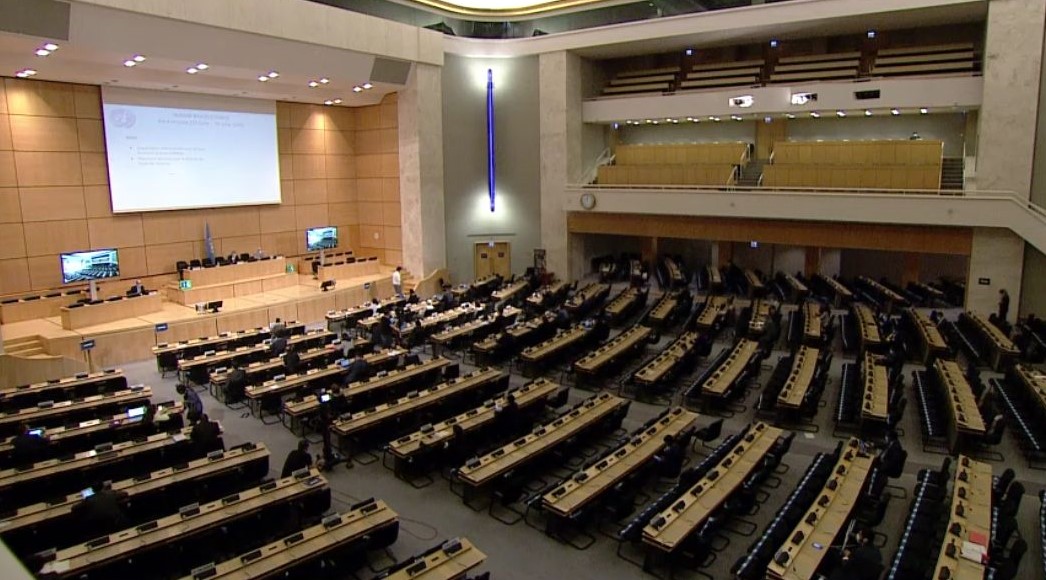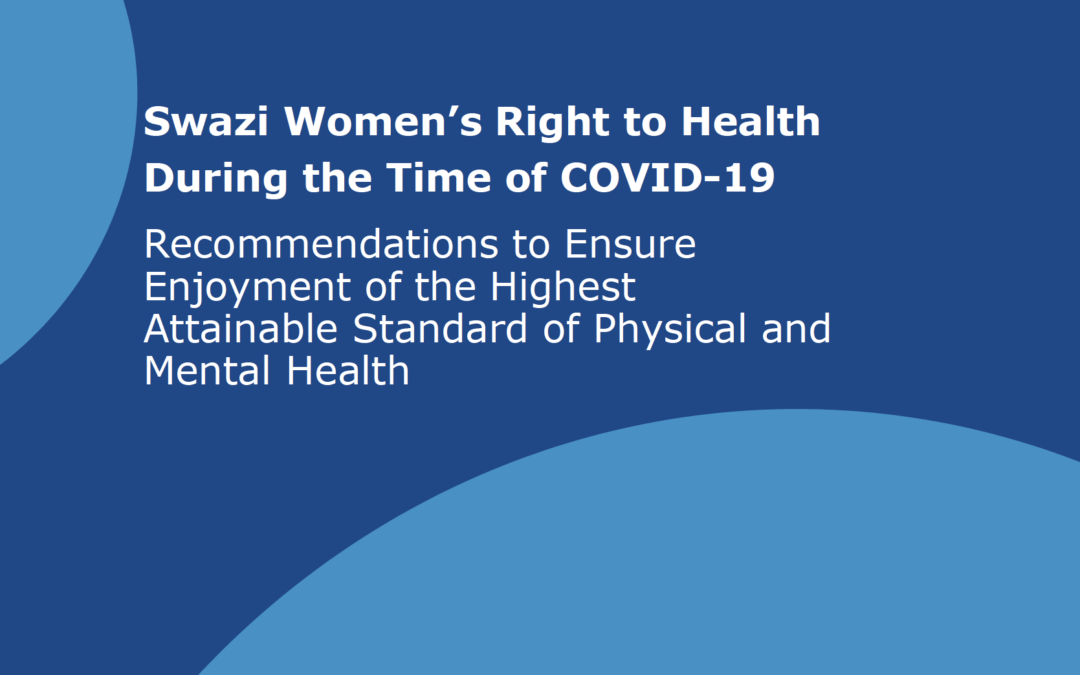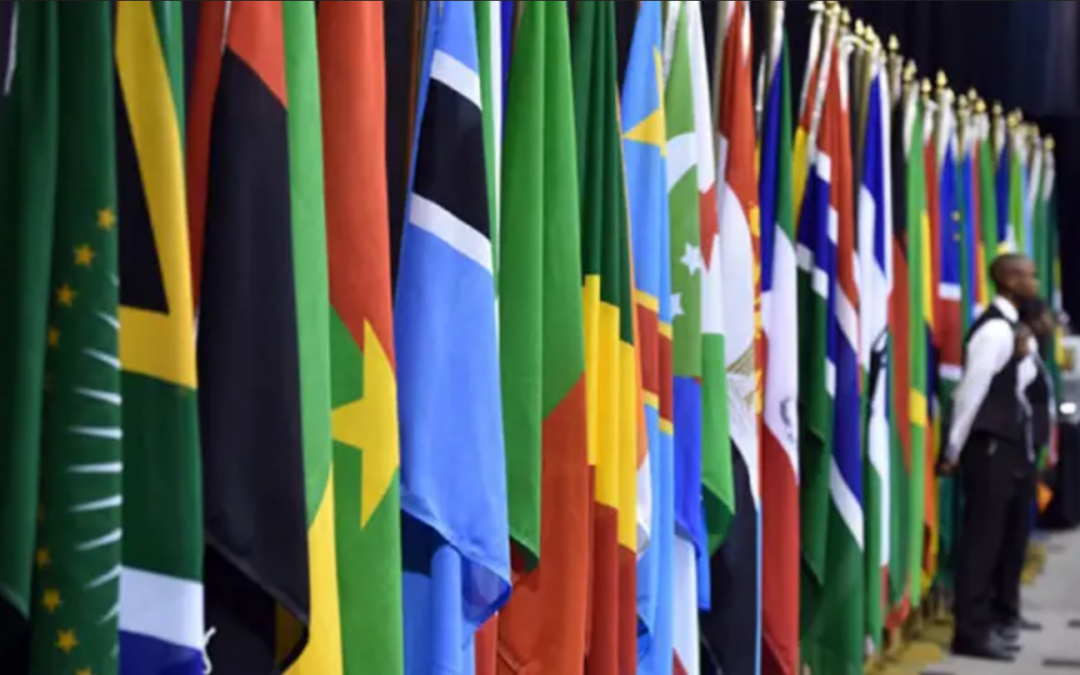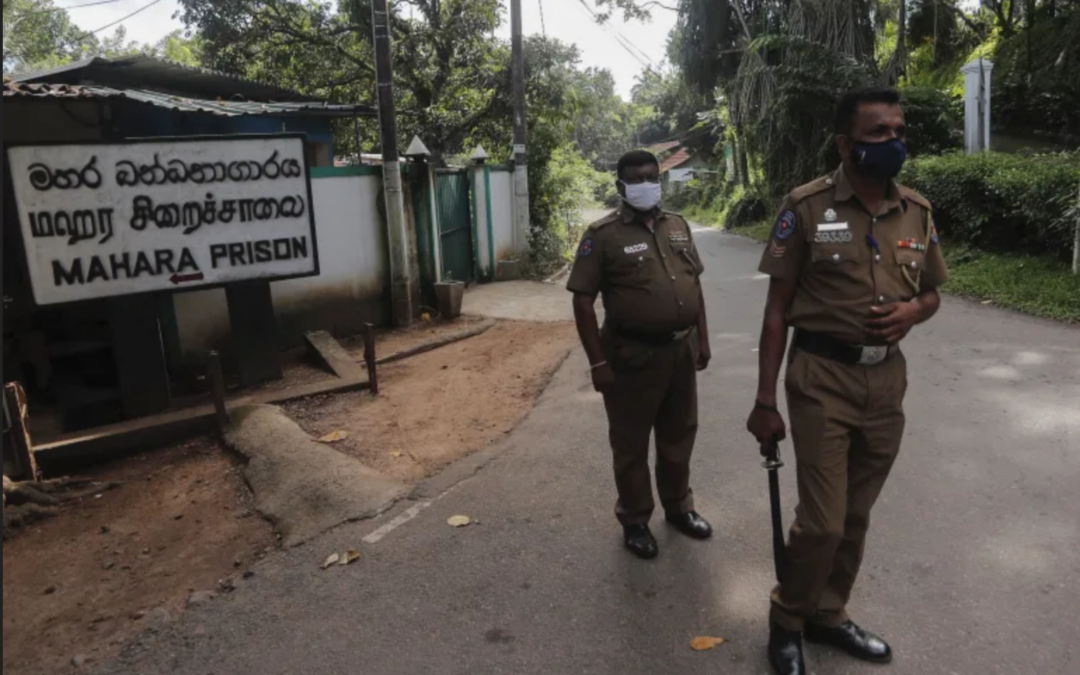
Mar 11, 2021 | Advocacy, Non-legal submissions
Today, the ICJ called on the Office of the High Commissioner for Human Rights to guarantee transparency and participation in its activities in Venezuela in an oral statement delivered during the interactive dialogue on the oral update by the UN’s High Commissioner of Human Rights on Venezuela.
The statement reads as follows:
“Madame President,
The International Commission of Jurists (ICJ) welcomes the High Commissioner’s oral update on the situation of human rights in Venezuela, particularly regarding the cooperation between her office and the Venezuelan authorities.
The ICJ underscores the importance of transparency on the activities conducted under the Memorandum of Understanding (MoU) signed by both parties. Publication of the MoU to inform the public and ensure the optimal engagement of stakeholders is critical to its success.
The ICJ stresses that in addition to civil and political rights, economic, social, cultural rights continue to be violated in Venezuela, a situation aggravated by the COVID-19 pandemic. As of January 2021, at least 37 health workers have died due to the lack of protective equipment and basic supplies in healthcare centers.
In light of recent announcements by Venezuelan authorities, political considerations appear to be a driving factor in the COVID-19 vaccine prioritization plan, instead of objective and public health criteria, which could lead to discrimination and a denial of equal protection of law.
The ICJ recommends that the High Commissioner monitor and report on the status of the Venezuelan authorities’ compliance with her previous recommendations, and on her broader engagement with local civil society with a view to protecting human rights.
Thank you.”
Contact:
Massimo Frigo, ICJ UN Representative, e: massimo.frigo(a)icj.org, t: +41797499949

Mar 8, 2021 | Advocacy, Analysis briefs
On International Women’s Day 2021, the ICJ publishes a paper considering the ways in which women in Eswatini face systematic discrimination in laws and practices, in violation of the country’s obligations under international human rights law with respect to women and girls’ right to health, including sexual and reproductive health.
The publication concludes with recommendations to the Eswatini authorities on how they may enhance women and girls’ ability to fully and equally benefit from and enjoy their right to health and their other human rights without discrimination.
The paper is entitled “Swazi Women’s right to health during the time of COVID-19: Recommendations to ensure enjoyment of the highest attainable standard of physical and mental health”. It was launched through a conversation with Zanele Thabede-Vilakati, the National Director of Women and Law in Southern Africa (WLSA) Research and Educational Trust in Eswatini. In the discussion, Thabede-Vilakati outlined the obstacles faced by Swazi women before and after the COVID-19 pandemic. Talking about the ICJ publication, she added:
“The ICJ report on Swazi Women’s Right to Health during COVID-19 is an in-depth observation of all the issues which women face in their daily lives in getting access to their basic right to health. The recommendations made by the ICJ can only enrich Eswatini authorities’ approach to protecting and empowering women and I hope that they take these recommendations on.”
The report considers Eswatini’s obligations not only under national law, including under the Swazi Constitution, but also under international law in an effort to assess whether Eswatini is complying with its human rights obligations.
The report reflects on the obstacles that Swazi women have faced before and during the COVID-19 pandemic in exercising their right to health. Some of the key human rights concerns include: lack of access to sexual and reproductive healthcare; the high prevalence of HIV/AIDS among Swazi women; obstacles in accessing sexual and gender-based violence-related healthcare services; and inadequate access to shelters and housing for women in Eswatini.
Based on the publication’s assessment, recommendations are addressed to Eswatini authorities for specific measures to be taken to protect women, as well as meet Eswatini’s obligations under national, regional and international law.
Speaking about the report, ICJ’s Africa Regional Programme Director, Kaajal Ramjathan-Keogh stated,
“The right to health is a crucial right to everyone, but in a country such as Eswatini – one of the most severely HIV affected countries in the world – women’s right to health is a priority as women remain disproportionally affected by HIV. We hope that this report and its recommendations cause the relevant actors to reflect on ways in which they can assist Swazi women, especially in light of the increased obstacles that women have faced in accessing their right to health due to the COVID-19 pandemic.”
In order to realize the right to health of women and girls in Eswatini, the report recommends that the Eswatini authorities take certain measures, including the following:
- Ensure access to family planning health services for all women and LGBT persons;
- Parliament must enact domestic legislation, which clarifies the circumstances under which abortion is legally available to women;
- Ensure all health facilities, throughout the country, are equipped with all essential medicines;
- Guarantee access to information and education on sex, sexuality, HIV, sexual and reproductive rights especially for adolescents and youth;
- Prioritise the provision of pre- and post-natal healthcare services in a manner that does not risk COVID-19 transmission; and
- Repeal discriminatory laws, policies and practices in the area of sexual and reproductive health, including restrictive abortion laws and laws and policies that discriminate against LGBT persons;
- Adopt legislation providing for legal aid to enable victims of gender-based violence to be better able to access justice and effective remedies for SGBV, including through courts;
- Ensure comprehensive services for survivors of sexual and gender-based violence are available during the pandemic;
- Increase access to healthcare services for victims and survivors of gender-based violence, including medical and psychosocial support and ensure adequate rape kits in all health centres; and
- Increase access to shelters and alternative accommodation for victims of gender based and domestic violence in Eswatini, including accommodation or shelters that should be made available in all parts of the country.
Background
Eswatini is a monarchy. Under its Constitution, customary law, except insofar as it is inconsistent with the former, is recognized as part of Eswatini’s legal system in addition to common law and statutory law. Eswatini is party to several binding international, including regional, human rights treaties guaranteeing the right to health, including sexual and reproductive health, for everyone, including women and girls. Irrespective of the protections afforded in Eswatini’s domestic legal system, as a matter of international human rights law, Eswatini is bound to fulfil its obligations to realize the right to health, including sexual and reproductive health.
Contact
Nokukhanya (Khanyo) Farisè, Legal Adviser (Africa Regional Programme), e: nokukhanya.farise(a)icj.org
Tanveer Jeewa, Communications Officer (Africa Regional Programme), e: tanveer.jeewa(a)icj.org
Download
Eswatini-Swazi Women Right to Health during COVID19-Report-2021-ENG
Mar 5, 2021 | News, Op-eds
An opinion piece by ICJ Commissioner, Rodrigo Uprimny, asks whether the existing COVID-19 vaccine patenting arrangements favouring the intellectual property interests of pharmaceuticals come at an unacceptable cost to protecting the life and health of millions. Commissioner Uprimny is also Researcher at Dejusticia and member of the UN Committee on Economic, Social and Cultural Rights.
During an informal conversation I was asked:
“Why is it that, although so many of us are dying due to COVID-19 and suffering from the dramatic state of the economy, we continue to wait for vaccines despite the availability of so many safe and effective ones? Is it that we cannot produce the vaccines locally?
The answer to this simple but essential question is that vaccine access is no longer a technical but also a political issue.
While Colombia cannot technically manufacture or produce some COVID-19 vaccines such as those based on the RNA messengers, many other countries, including several in the global South such as India, Argentina or Brazil, could. As has been highlighted by Doctors without Borders, there is no technical obstacle to mass vaccine production that would allow to vaccinate every one of the 7.8 billion human beings on earth within a few months
Instead, the obstacle is legal and political. It is the intellectual property that provides patents to pharmaceutical companies, who have developed COVID-19 vaccines. That creates a temporary monopoly. During such a temporary monopoly period, which usually lasts 20 years, no other company can produce their vaccines without permissions. As a consequence, those companies can impose and regulate the prices and conditions for the production of their vaccines.
Patents are defended by high-income countries, where many large pharmaceutical companies are based. They argue that there would be no innovation without patents as companies would not have incentives to research and develop new products.
Here, I will not dispute this defense of intellectual property, which is highly debatable. I would instead like to pose this question: even if patents were good and helped innovation, is it fair that they remain intact during the COVID-19 pandemic if they prevent rapid access to vaccines all over the world? The answer to this question is no, because we are condemning millions of people to die, but also because the epidemiological risks are extremely high. Each contagion poses a new risk for a novel coronavirus mutation that may eventually result in a variant that could escape the efficacy of current vaccines. It is also possible that a new mutation has a severe impact on the health of children, who have been somewhat spared from the more lethal impacts of COVID-19 until now.
In light of the current situation, without challenging the institution of intellectual property as such, South Africa and India issued a proposal to the World Trade Organization, the international organization overseeing such trade-related issues. They proposed a temporary exemption (or “waiver”) of patents on vaccines and treatments for COVID-19 at least until the pandemic is under control. A potential, fair compensation for companies who discovered the vaccines might also been considered, although obviously discounting the immense financial support they have already received from public funding.
This temporary exemption is crucial as current flexibilities in patent rights, such as compulsory licenses, are too rigid and limited to face the current crisis. This waiver provides the only opportunity for companies and States, with sufficient technical capabilities, to mass-produce necessary vaccines without having to fear the severe penalties of patent (intellectual property) violations.
While this proposal continues to face resistance from certain countries in the Global North, it is receiving growing support from many states, scientific and humanitarian organizations. Regrettably, the Colombian government has refrained from supporting it, with the shameful argument that more evidence needs to be provided. More evidence of what? Does it not suffice that we currently do not have access to necessary vaccines, although technically we could produce ample amounts? Or that available vaccines are, above all, headed to high-income nations? And is this mainly due to patents on vaccines that, far from being a fair award for innovation, seem to be letters of marque in favor of pharmaceutical companies, without any consideration of deaths and harms caused by the global lack of COVID-19 vaccines?
This op-ed was first published on El Espectador, 27 February 2021.
Download the Op-Ed in English and Spanish.
ICJ Statements on Vaccine Access:
Global: “ICJ calls on States to ensure human rights compliant access to COVID-19 vaccines (UN Statement)”: (1 March 2021)
Global: “ICJ urges the UN Committee on Economic, Social and Cultural Rights to call on States to comply with their obligations to ensure equitable access to vaccines for all” (15 Feb 2021): https://www.icj.org/icj-urges-the-un-committee-on-economic-social-and-cultural-rights-to-call-on-states-to-comply-with-their-obligations-to-ensure-equitable-access-to-vaccines-for-all/
Peru: “The COVID-19 vaccine demands international and national solidarity” (23 Feb 2021): https://www.icj.org/the-covid-19-vaccine-demands-international-and-national-solidarity/
Africa: “The ICJ recommends that the African Union acknowledge COVID-19 vaccines are a “public good” (4 Feb 2021): https://www.icj.org/the-icj-recommends-that-the-african-union-acknowledge-covid-19-vaccines-are-a-public-good/
Zimbabwe: “The ICJ and ZimRights ask for urgent intervention on access to COVID-19 vaccines from African Commission Mechanism” (19 Feb 2021): https://www.icj.org/the-icj-and-zimrights-ask-for-urgent-intervention-on-access-to-covid-19-vaccines-from-african-commission-mechanism/
Further reading:
UN Special Procedures: “COVID-19: UN experts urge WTO cooperation on vaccines to protect global public health” (1 March 2021): https://www.ohchr.org/EN/NewsEvents/Pages/DisplayNews.aspx?NewsID=26817&LangID=E
UN Special Procedures: “Statement by UN Human Rights Experts Universal access to vaccines is essential for prevention and containment of COVID-19 around the world” (9 Nov 2020): https://www.ohchr.org/EN/NewsEvents/Pages/DisplayNews.aspx?NewsID=26484&LangID=E
UN CESCR Committee: “Statement on universal and equitable access to vaccines for the coronavirus disease (COVID-19)” (27 Nov 2020) https://tbinternet.ohchr.org/_layouts/15/treatybodyexternal/Download.aspx?symbolno=E/C.12/2020/2&Lang=en
IACHR and its SRESCER: “IACHR and its SRESCER Call on American States to Make Public Health and Human Rights the Focus of All their Decisions and Policies Concerning the COVID-19 Vaccine” (5 Feb 2021): http://www.oas.org/en/IACHR/jsForm/?File=/en/iachr/media_center/PReleases/2021/027.asp

Feb 4, 2021 | Advocacy, News
The ICJ, in a letter to the Chairperson of the African Union, recommended that the African Union acknowledge that COVID-19 vaccines are a “public good” and all States must ensure access to these vaccines in order to realize the human rights of their inhabitants.
The African Charter on Human and People’s Rights, to which most AU Member States are Party, provides that “every individual shall have the right to enjoy the best attainable state of physical and mental health” (Art 16(1)). The Charter also places an obligation on the States Parties to take all “necessary measures to protect the health of their people and to ensure that they receive medical attention when they are sick” (Art 16(2)).
This obligation must be understood consistently with the equivalent Article 12 of the International Covenant on Economic, Cultural and Social Rights (ICESCR), to which most AU Member States are also Party. That provision protects the right to the “highest attainable standard of physical and mental health”, and requires States to take all necessary measures to realize this right including to ensure “the prevention, treatment and control of epidemic, endemic, occupational and other diseases” (Art 12(1)(c)). Vaccines, for some such diseases including COVID-19, are necessarily an integral part of prevention, treatment and control.
“It is essential for the process of vaccine procurement and allocation to be in line with international human rights standards. The African continent and its people cannot afford to be left behind, and the best way to ensure that does not happen is to move forward and prioritize each individuals right to health and corresponding human rights.” –
Justice Sanji Monageng, ICJ Commissioner, Botswana
Therefore, under these treaties and other internationally binding human rights law, it is clear access to certain vaccines is necessary to fulfill a human right, must not be seen as a privilege. Vaccines are a public good and should be treated as such by States. This understanding was affirmed by the UN Committee on Economic, Social and Cultural Rights (CESCR) in December in a statement on universal and equitable access to vaccines. CESCR stressed that: “every person has a right to have access to a vaccine for COVID-19 that is safe, effective and based on the application of the best scientific developments”. It further implored States to “give maximum priority to the provision of vaccines for COVID-19 to all persons”.
Recommendations of the International Commission of Jurists
The AU will be expected by the constituents of its Members to fulfil its proper leadership function in terms its Constitutive Act an ensure the promotion and protection of human rights in Africa. To this end, the ICJ calls upon the AU to adopt resolutions:
- Calling on all member States to ensure that their COVID-19 responses, including vaccine acquisition and distribution, comply with international human rights law and standards including those particularly relating to the rights to health and to duty ensure this right is realized through international cooperation.
- Calling on all member States to endorse and fully participate in the WHO’s COVID-19 Technology Access Pool.
- Calling on all member States to openly support the approval and implementation of a waiver of intellectual property rights in terms of the TRIPS agreement in order to ensure equitable and affordable access of COVID-19 vaccines and treatment for all.
- Calling on all member States to urgently publish public, comprehensive vaccine rollout plans and transparently provide clear and full health-related information to their populations.
- Calling on all participants in COVAX to endorse and fully participate in the WHO’s COVID-19 Technology Access Pool.
- Calling on the WTO to respond expeditiously and favourably to the proposal communicated by India and South Africa for waiver of IP protection for vaccines.
To read the full submission, click here.
Contact
Kaajal Ramjathan-Keogh, ICJ Africa Director Kaajal.Keogh(a)icj.org +27 84 5148039
Tanveer Jeewa, Media and Legal Consultant Tanveer.Jeewa(a)icj.org

Dec 2, 2020 | News
The ICJ today called upon the Sri Lankan authorities to conduct a prompt, thorough and impartial investigation into the events involving the use of lethal force by prison guards at Mahara prison on 29 and 30 November, which left at least nine inmates killed and over hundred others injured.
The action by the guards was taken in response to unrest resulting from protests by inmates over unsafe and overcrowded conditions in the context of the COVID-19 pandemic.
The ICJ also called for urgent measure to address the unsafe conditions in Sri Lankan prisons to protect the right to health and life, including where necessary by releasing detainees.
“The tragic events of Mahara prison are a consequence of the failure of the Sri Lankan authorities to effectively address the situation of prison conditions, which has turned into a full blown human rights and public health crisis in the wake of the COVID-19 pandemic”, said Ian Seiderman, ICJ Legal and Policy Director
The unrest was the culmination of a series of protests staged by the prisoners demanding an increase in coronavirus testing and new isolation facilities for infected prisoners. According to Senaka Perera, President of the Committee for Protecting the Rights of the Prisoners, around 200 inmates of the Mahara prison have been infected with COVID-19.
While the Minister of Rehabilitation and Prison Reforms and the Inspector General of Police have instructed the Criminal Investigation Department to probe the unrest caused at the Mahara Prison, the Minister of Justice has formed a separate five-member committee, chaired by former High Court Judge Kusala Saorini Weerawardena, to conduct its own investigation.
The ICJ recalls that under international law, the use of lethal force by State authorities is only permissible where strictly necessary to protect life. This standard should govern any investigation, and those responsible for unlawful conduct resulting in death or injuries to prisoners must be held to account.
“In addition to ensuring accountability and redress for any violations at the Mahara Prison, the authorities must act swiftly to meet the legitimate grievances of detainees throughout the country”, added Ian Seiderman.
“An effective response is not optional, but is necessary to fulfill the State’s legal obligation to provide for equal access to healthcare and health services to prisoners, who are among the most vulnerable to the ravages of COVID-19 in highly unsafe, enclosed and overcrowded environments.” Seiderman added.
The incident follows a wave of similar protests in several other prisons in the country. On 18 November, five inmates who were under quarantine at the Old Bogambara Prison attempted to break out and an inmate was shot dead when the prisoner officers opened fire at the fleeing inmates.
The ICJ called for the release of detainees who are particularly at risk of losing their life or suffering severe health effects from COVID-19. This would also apply to other convicts who could be released without compromising public safety, such as those sentenced for minor, non-violent offences.
Background
Speaking in Parliament on Monday, Minister of Rehabilitation and Prison Reforms Dr. Sudharshini Fernandopulle stated that the Government has taken steps to reduce overcrowding by directing COVID-19 positive prisoners out of the prisons to the Welikanda Hospital and moving all women inmates to the Kandakadu Rehabilitation Centre. She also stated that a mechanism has been put in place to obtain bail for those arrested for minor drug offences. Moreover, a presidential pardon has been granted to over 600 convicts of minor offences who were in remand due to their inability to pay the required fine.
Several UN bodies, including the WHO and OHCHR, came together in recommending that States consider limiting the deprivation of liberty including pretrial detention, to a measure of last resort and enhance efforts to resort to non-custodial measures.
Contact
Osama Motiwala, Communications Officer – osama.motiwala(a)icj.org








